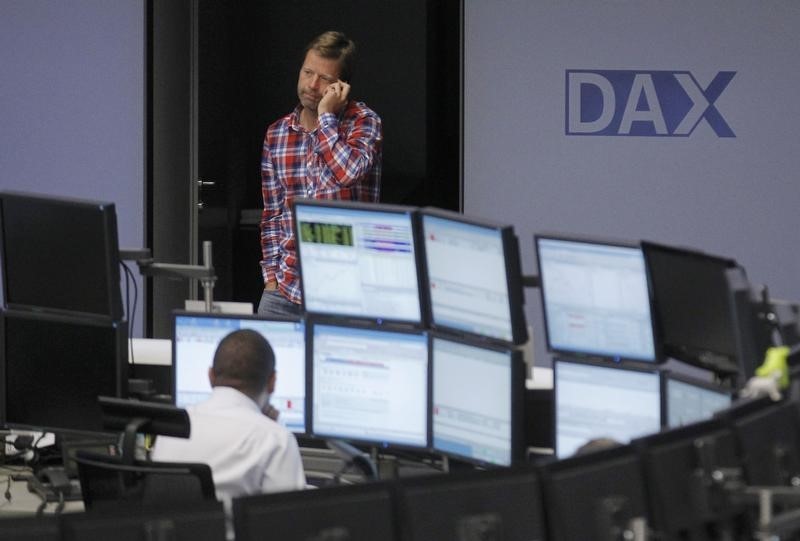By Dhara Ranasinghe
LONDON (Reuters) - Borrowing costs across the euro zone touched multi-week lows on Monday, as a legislative defeat for U.S. President Donald Trump on healthcare reforms raised questions about his ability to push through tax cuts and fiscal spending to boost the economy.
As investors reassessed the outlook for growth and inflation, analysts said bets that the European Central Bank could look to tighten monetary policy sooner rather than later were also being scaled back.
Bond yields in Germany and France fell to their lowest levels in around three weeks, while U.S. 10-year Treasury yields tumbled to one-month lows.
Since November's U.S. election, expectations that large fiscal stimulus under a Trump administration would help push up economic growth and inflation have boosted risk assets and dented safe-haven bonds in the U.S. and Europe.
But the healthcare bill was pulled from the floor of the House of Representatives on Friday because it failed to draw enough support from within Trump's Republican Party - throwing so-called "Trump reflation" bets into reverse.
Stock markets tumbled and the dollar slid to its lowest since November against a basket of currencies (DXY).
"The disappointment about the pro-growth policies of Trump are causing investors to reassess the future," said Martin van Vliet, senior rates strategist at ING.
"It also means that this hawkish ECB trade where some investors have been betting the ECB could even lift the depo rate is being reassessed."
Two senior ECB policymakers laid out diverging views on the bank's ultra-loose monetary policy on Monday, laying bare the rift at the top between supporters and critics of the direction the bank has taken under President Mario Draghi.
Peter Praet, the ECB's chief economist and a key ally of Draghi's, argued that the euro zone still needed substantial stimulus.
But his fellow ECB Executive Board member Sabine Lautenschlaeger, a German who tends to side with more conservative rate-setters, said the bank should start making plans for an eventual end to its current extraordinary stimulus.
Money markets price in a roughly 70 percent chance of a rate rise at the ECB's December meeting, down from as high as 80 percent earlier this month.
STRONGER INTEREST
German and French 10-year bond yields fell about 4 bps each to their lowest levels in almost three weeks, at 0.36 percent <DE10YT=TWEB> and 0.93 percent <FR10YT=TWEB> respectively, while U.S. equivalents hit a one-month low of 2.35 percent (US10YT=RR).
They pulled back from those lows as the session wore on but remained slightly lower on the day.
A slight outperformance in French bonds pushed the yield gap over German peers to around 57 bps - its tightest in around two months.
Spanish yields briefly touched a one-month low at 1.64 percent <ES10YT=TWEB>, while Portugal's fell to more than two-month lows at 3.79 percent <PT10YT=TWEB>.
"We've seen a strong performance in U.S. Treasuries, weakness in equities and the dollar," said DZ Bank strategist Christian Lenk. "It all fits together in terms of stronger interest for fixed income."
For Reuters Live Markets blog on European and UK stock markets see reuters://realtime/verb=Open/url=http://emea1.apps.cp.extranet.thomsonreuters.biz/cms/?pageId=livemarkets
